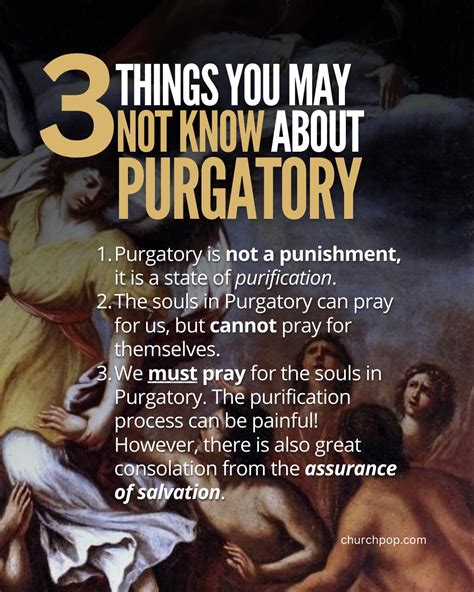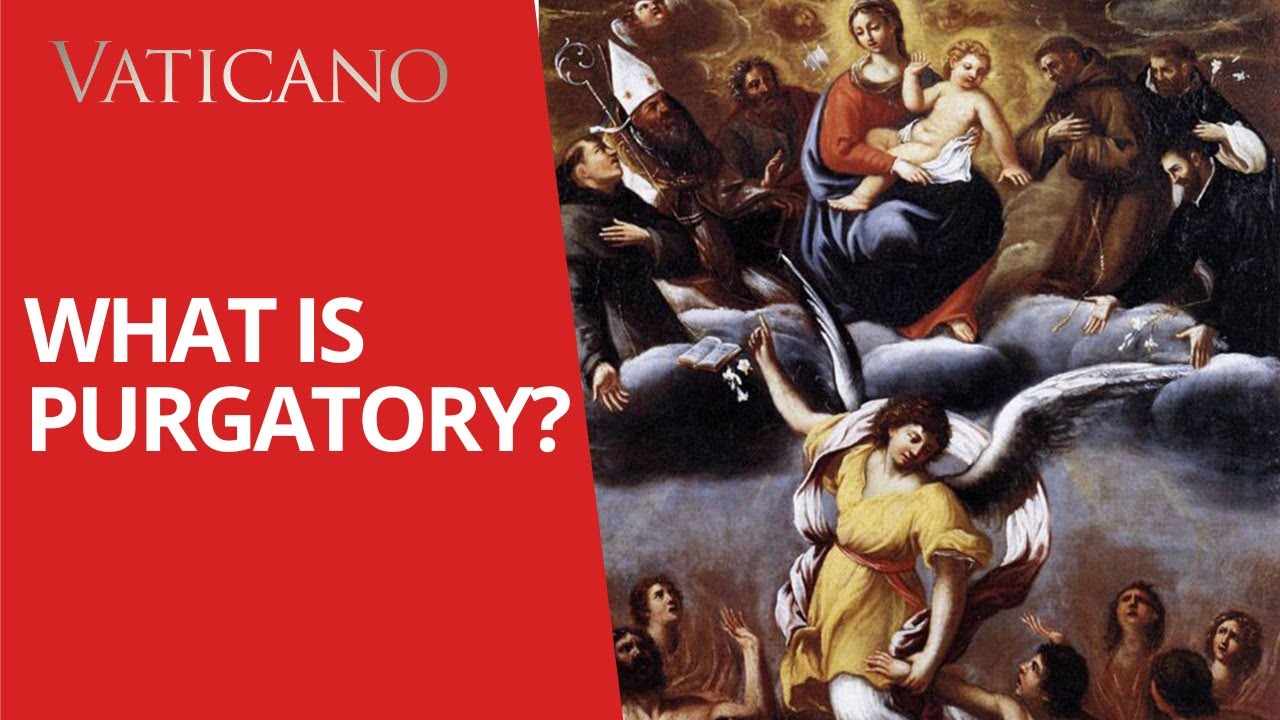What Is Purgatory

Purgatory, a concept deeply rooted in Catholic theology, has been a subject of fascination and debate for centuries. The idea of a intermediate state between heaven and hell, where souls undergo purification before entering the presence of God, has evolved over time, influenced by various theological and philosophical perspectives. To understand the nuances of purgatory, it is essential to delve into its historical context, theological underpinnings, and the ways in which it has been perceived and practiced within the Catholic tradition.
The concept of purgatory is not explicitly mentioned in the Bible, but it is based on several scriptural passages, including 2 Maccabees 12:46, which speaks of praying for the dead, and Matthew 5:48, which emphasizes the importance of being perfect as God is perfect. The early Church Fathers, such as St. Augustine and St. Gregory the Great, also wrote about the possibility of a temporary punishment for sins after death. Over time, the doctrine of purgatory developed, and by the 13th century, it had become a widely accepted teaching within the Catholic Church.
Key Points
- The concept of purgatory is based on the idea of purification of the soul after death, preparing it for heaven.
- Purgatory is not explicitly mentioned in the Bible but is rooted in scriptural passages and early Church Fathers' writings.
- The doctrine of purgatory developed over centuries, influenced by theological and philosophical perspectives.
- The Catholic Church teaches that purgatory is a temporary state where souls are purified of their sins, with the help of prayers and sacrifices of the living.
- The concept of purgatory has been subject to various interpretations and criticisms, both within and outside the Catholic Church.
The Theological Underpinnings of Purgatory

The Catholic Church teaches that purgatory is a temporary state where souls are purified of their sins, with the help of prayers and sacrifices of the living. This purification is necessary because, according to Catholic doctrine, nothing unclean can enter heaven (Revelation 21:27). The souls in purgatory are believed to be in a state of grace, having been forgiven of their mortal sins, but still requiring purification to achieve the holiness necessary to enter heaven.
The concept of purgatory is closely tied to the Catholic teaching on the communion of saints, which holds that the living and the dead are united in a spiritual bond. The living can assist the souls in purgatory through their prayers, sacrifices, and good works, which can help to shorten their time in purgatory. This belief is rooted in the idea that the Church is a single, unified body, with the living and the dead forming a single community of faith.
The Practice of Praying for the Dead
The practice of praying for the dead is an essential aspect of the Catholic tradition, and it is closely tied to the concept of purgatory. Catholics believe that the prayers of the living can help to assist the souls in purgatory, by obtaining for them the graces they need to achieve purification. The most common prayer for the dead is the Mass, which is offered for the intention of the deceased. Other prayers, such as the rosary and the Stations of the Cross, are also commonly used to pray for the dead.
| Prayer | Purpose |
|---|---|
| Mass | Offered for the intention of the deceased, to assist their purification in purgatory. |
| Rosary | Prayed for the dead, to obtain graces for their purification and to help them achieve heaven. |
| Stations of the Cross | Prayed for the dead, to meditate on the Passion of Christ and to obtain graces for their purification. |

Criticisms and Controversies Surrounding Purgatory

The concept of purgatory has been subject to various criticisms and controversies, both within and outside the Catholic Church. Some have argued that the idea of purgatory is not supported by Scripture, and that it is a product of medieval Catholic theology. Others have criticized the practice of praying for the dead, arguing that it is a form of superstition or that it undermines the concept of salvation by faith alone.
Within the Catholic Church, there have been debates about the nature of purgatory, with some theologians arguing that it is a temporary state of punishment, while others see it as a process of purification and growth. The Catholic Church has also faced criticisms from other Christian denominations, which have rejected the concept of purgatory as unscriptural or as a form of Catholic dogma.
The Evolution of Purgatory in Modern Catholic Theology
In recent years, there has been a shift in the way that purgatory is understood within Catholic theology. Some theologians have emphasized the idea of purgatory as a process of growth and purification, rather than a temporary state of punishment. Others have highlighted the importance of the communion of saints, and the role that the living can play in assisting the souls in purgatory through their prayers and sacrifices.
The Catholic Church has also recognized the importance of ecumenical dialogue, and has engaged in discussions with other Christian denominations about the concept of purgatory. While there are still significant differences in understanding and practice, these discussions have helped to promote greater understanding and cooperation between different Christian traditions.
What is the purpose of purgatory in Catholic theology?
+The purpose of purgatory is to purify the souls of the deceased, preparing them for heaven. According to Catholic doctrine, nothing unclean can enter heaven, and purgatory provides a temporary state where souls can be purified of their sins.
How do Catholics pray for the dead?
+Catholics pray for the dead through various means, including the Mass, the rosary, and the Stations of the Cross. These prayers are offered to assist the souls in purgatory, to obtain graces for their purification, and to help them achieve heaven.
What are some criticisms of the concept of purgatory?
+Some criticisms of purgatory include the argument that it is not supported by Scripture, and that it is a product of medieval Catholic theology. Others have criticized the practice of praying for the dead, arguing that it is a form of superstition or that it undermines the concept of salvation by faith alone.
In conclusion, the concept of purgatory is a complex and multifaceted aspect of Catholic theology, with a rich history and a deep significance for the Catholic tradition. While it has been subject to various criticisms and controversies, it remains an essential part of Catholic doctrine and practice, highlighting the importance of the communion of saints and the role that the living can play in assisting the souls in purgatory. By understanding the theological underpinnings of purgatory, and the ways in which it is practiced and perceived within the Catholic Church, we can gain a deeper appreciation for the richness and diversity of Catholic tradition.



